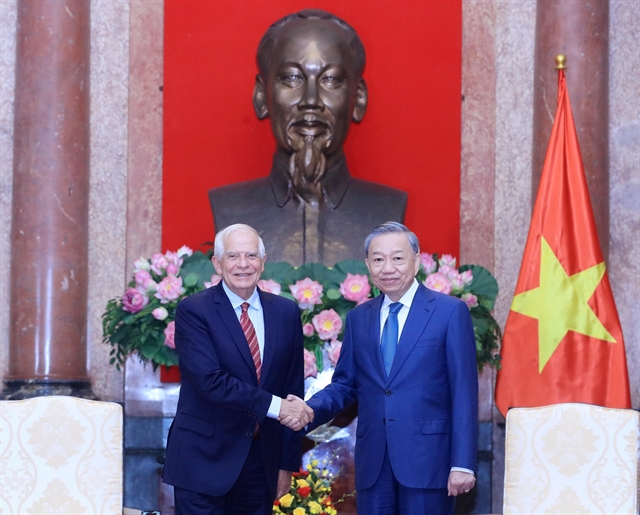 Politics & Law
Politics & Law


|
| President Tô Lâm with Josep Borrell Fontelles, High Representative of the EU for Foreign Affairs and Security Policy during their meeting on Tuesday. VNA/VNS Photo Lâm Khánh |
HÀ NỘI — The European Union (EU) views Việt Nam as a leading partner in the region and a key player in international ties and has implemented several strategies and initiatives to elevate Việt Nam-EU relations to new heights.
That was the message conveyed by Josep Borrell Fontelles, High Representative of the EU for Foreign Affairs and Security Policy during his meeting with President Tô Lâm on Tuesday. Fontelles is in Việt Nam on an official visit from July 29-31 at the invitation of Foreign Minister Bùi Thanh Sơn.
President Lâm thanked Fontelles for leading the EU delegation to attend the funeral of late Party General Secretary Nguyễn Phú Trọng, which demonstrated the EU's respect for the significant contributions of the General Secretary to strengthening Việt Nam-EU relations in recent years.
The President congratulated the EU on electing a new leadership and expressed confidence that Fontelles’ visit would provide important momentum to further strengthen Việt Nam-EU relations. He also acknowledged Fontelles’ contributions to the relationship during his tenure as President of the European Parliament from 2004 to 2007.
Emphasising that the EU is a very important partner for Việt Nam, President Lâm expressed satisfaction with the positive development of relations between Việt Nam and the EU, evident in the increased exchange of delegations and high-level contacts and the effective implementation of various agreements.
Four years since it was implemented, the Việt Nam-EU Free Trade Agreement (EVFTA) has given a new impetus to trade and investment, making Việt Nam the largest trading partner of the EU among ASEAN countries. Cooperation in tourism, education and training, culture and arts and people-to-people exchanges has also been dynamic, contributing to mutual understanding and fostering cooperation in other areas.
The President suggested that both sides continue to strengthen delegation exchanges, especially at high levels, and effectively implement the Việt Nam-EU Partnership and Cooperation Agreement (PCA), the EVFTA and other agreements.
He also urged the EU to encourage its remaining member states to promptly ratify the EU-Việt Nam Investment Protection Agreement (EVIPA), to lift the yellow card issued against Việt Nam’s seafood exports based on Việt Nam’s efforts and results in combating illegal, unreported, and unregulated (IUU) fishing, and to continue providing Official Development Assistance (ODA) to Việt Nam.
The president also requested support for Việt Nam’s effective implementation of the Just Energy Transition Partnership (JETP) and called for enhanced cooperation on cybersecurity, maritime security, disaster prevention and response, crisis management and crime prevention.
Welcoming the EU’s strategies and initiatives for cooperation in the Indo-Pacific region, President Lâm said Việt Nam would be ready to act as a bridge for the EU in the region, including strengthening ASEAN-EU strategic partnership relations.
The EU high representative said he appreciated Việt Nam’s balanced foreign policy and supported Việt Nam’s goals to become a developed, high-income country by 2045 and achieve carbon neutrality by 2050.
On international and regional issues, both sides agreed that countries needed to contribute responsibly to security and development both regionally and globally, and that conflicts should be resolved through peaceful means based on international law and the UN Charter.
Regarding the East Sea (internationally known as the South China Sea), both sides reaffirmed their support for ensuring security, safety and freedom of navigation and overflight and for resolving disputes in the East Sea through peaceful means in accordance with international law, particularly the 1982 UNCLOS. — VNS




